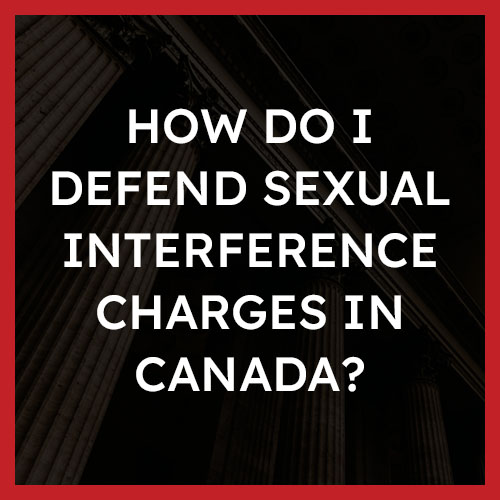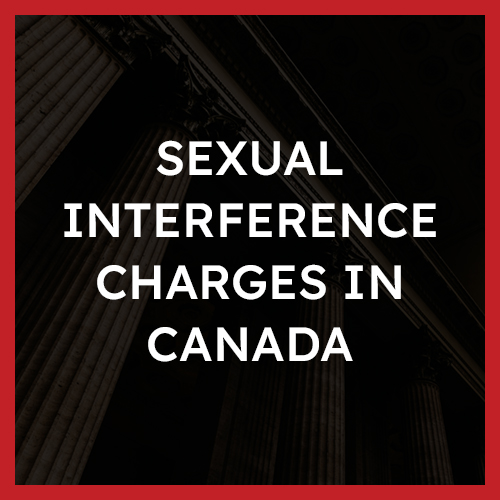How Do I Defend Sexual Interference Charges in Canada?

For the Crown to succeed in a sexual interference charge, there are three key elements:
- Touching the body of a child under 16 years old;
- The touching was done with an object or a part of the accused’s body; and
- The touching was done for a sexual purpose.
The relevant provision for sexual interference in the Code is:
Sexual interference
151 Every person who, for a sexual purpose, touches, directly or indirectly, with a part of the body or with an object, any part of the body of a person under the age of 16 years
(a) is guilty of an indictable offence and is liable to imprisonment for a term of not more than 14 years and to a minimum punishment of imprisonment for a term of one year; or
(b) is guilty of an offence punishable on summary conviction and is liable to imprisonment for a term of not more than two years less a day and to a minimum punishment of imprisonment for a term of 90 days.
Beyond this, it is also an offence to invite a minor to touch another person. Per section 152 of the Code:
Invitation to sexual touching
152 Every person who, for a sexual purpose, invites, counsels or incites a person under the age of 16 years to touch, directly or indirectly, with a part of the body or with an object, the body of any person, including the body of the person who so invites, counsels or incites and the body of the person under the age of 16 years,
(a) is guilty of an indictable offence and is liable to imprisonment for a term of not more than 14 years and to a minimum punishment of imprisonment for a term of one year; or
(b) is guilty of an offence punishable on summary conviction and is liable to imprisonment for a term of not more than two years less a day and to a minimum punishment of imprisonment for a term of 90 days.
It is important to note that consent and mistake of age are generally not a defence to either of these offences. While there are limited exceptions, they are complex and fact specific.
The purpose of this article is to provide an overview of the procedural aspects of a sexual interference charge and the penalties you may face. For location specific information, please read the sexual interference page in the location nearest you or submit a request for consultation.
Investigation of Sexual Interference Charges
An investigation of a sexual interference allegation is typically initiated by the parent or guardian of the alleged victim (minor). They contact local police and report it. The police will request a statement from the complainant and any witnesses, then they will launch an investigation.
Because sexual interference is considered an extremely serious offence, it requires a thorough police investigation. Police will typically interview the child’s family, close friends, and the child themselves, along with any witnesses. A forensic examination or “sex assault kit” will likely also be completed. The kit requires a physical examination of the alleged victim be completed by a physician to determine if there are any visible signs of sexual interference. It should be noted, however, that absence of these indicators does not mean the charge will be dropped. Once the investigation is complete, if the police believe you are the perpetrator, you will be arrested.
It is important to note that regardless of whether police release you, after an arrest, the police must provide you with the opportunity to call a lawyer in private. If you choose to exercise this right, the police must stop questioning you until you have had the opportunity to do so.
As the victim of both offences must be under 16 years old, the Crown’s case will usually involve the witness testimony of a person under the age of 18. This in turn triggers several special rules with respect to evidence and procedure that can simplify and strengthen the prosecution’s case against you.
The list of options that will be available to the Crown at your trial include:
- Letting the witness testify outside the courtroom by television link;
- Letting a support person sit with the witness while they testify;
- Prohibiting the accused from personally asking the witness any questions; and/or
- Playing a video statement made by the witness on a previous date, and letting that statement become evidence.
Bail Process and Conditions for Sexual Interference Charges
How do I get myself or a loved one out on bail for sexual interference charges?
In most cases, if you are charged with sexual interference, you will require a formal bail hearing to be released. It is also likely that the Crown will seek an order that you be held in custody until your charges are dealt with unless you have a spotless criminal record. If you are released following the bail hearing, you will likely be subject to strict conditions, which are outlined below.
The bail hearing can be held within as little as 24 hours, a period that starts from the moment of arrest or detention. However, the Crown can request up to three days to prepare for your bail hearing and may ask the court for longer. An effective defence lawyer will ensure that your bail hearing occurs as soon as possible so that you are not in custody for any longer than necessary.
Loved ones are not able to contact you while you are detained. Unless the detained person is a minor, the police will not release any information to friends or family due to privacy laws. Your lawyer is the only person allowed to contact you. Once the police have verified your lawyer’s details, they will pass on information about your whereabouts, if requested.
Given these difficulties, while you are held in custody, it is best to appoint a competent defence lawyer as soon as possible to manage the legal process and communicate with loved ones. As noted previously, after an arrest, the police must provide you with the opportunity to call a lawyer in private. If you choose to exercise this right, the police must stop questioning you until you have had the opportunity to do so.
Once you retain one of our experienced criminal defence lawyers, we will begin working to secure your release on bail.
We will immediately do the following:
- Call into the correctional centre where you are being held and speak to you about next steps towards securing your release.
- Contact the prosecutor assigned to the bail hearing to start negotiating your release.
- Order and secure a copy of the police information package that details the allegations against you in advance of the bail hearing. This allows the lawyer to make meaningful representations to the court about why you should be released on bail.
- Conduct either an in-person or teleconference bail hearing to secure your release.
When you attend your bail hearing, the judge will consider the following factors:
- Is detention necessary to secure your attendance in court?
- Is detention necessary to protect the public from a substantial risk of re-offending?
- Is detention necessary in all the circumstances to maintain confidence in the administration of justice?
Rest assured, we will work to not only secure your release but also ensure the least restrictive set of bail conditions (including the minimum cash deposit) possible.
For our lawyers to secure less stringent conditions, the judge will need to be satisfied that you will attend court as required, and that you pose no significant risk of harm to the public. This is often difficult in a sexual interference case, but not impossible.
Our lawyers are often successful at persuading the Crown Prosecutor in charge of bail to let our clients out. If we can’t convince the prosecutor, we can conduct a formal bail hearing and work to convince the court. Even if you are ultimately detained, we can appeal that decision on very short notice through a bail review.
To learn more about bail hearings in your area, including where your bail hearing will take place and contact information, please read the sexual interference page in the location nearest you or submit a request for consultation.
Where can I pay bail for sexual interference charges?
If you or a loved one are charged with sexual interference and granted bail, you will likely be required to provide a cash deposit to secure release. The mode by which you pay the cash deposit will depend on the courthouse at which your bail hearing is held. Your defence lawyer will advise you on the procedures specific to your location and will be able to explain the options for payment to you, or to a loved one who is making the payment on your behalf.
To learn more about paying bail in your area, please read the sexual interference page in the location nearest you or submit a request for consultation.
How do I change my release conditions for sexual interference charges?
If you are released on bail with sexual interference charges, you will almost always require a The penalties for sexual interference can be devastating. These types of charges have mandatory minimum jail sentences that reflect the seriousness of the offence. Sexual interference is a hybrid offence, meaning the Crown can choose to proceed by way of summary or indictment, indictment being the more serious of the two. For a sexual interference conviction, you can expect: Beyond any immediate jail and/or probation sentence you receive, you can also expect to receive additional penalties, including: As a registered sex offender, you will have to provide the police personal information including: A conviction for sexual interference will result in a mandatory minimum 10-year SOIRA order for just one offence, which can have significant and overwhelming consequences for your future. Under a SOIRA order you are required to report to the Sexual Registry anytime you: Furthermore, your personal information will remain in the Sexual Registry database indefinitely. It is important to note that aside from the penalties associated with a sexual interference charge, if convicted, you will face penalties associated with sexual assault as well. Please see here for more information.Penalties for Sexual Interference Charges
About The Author







